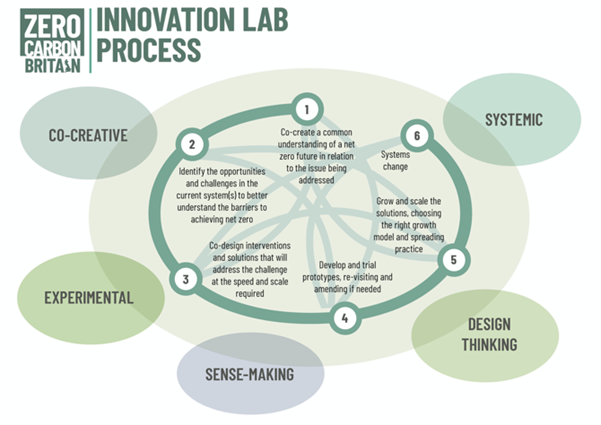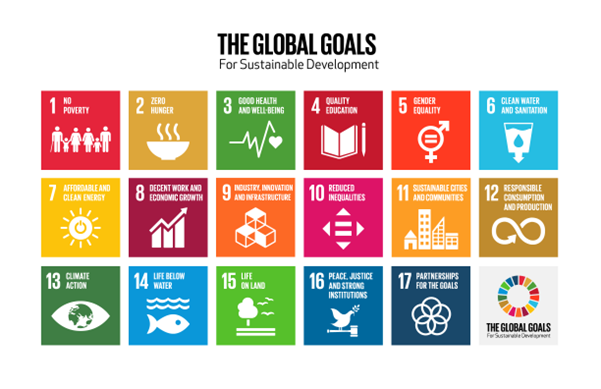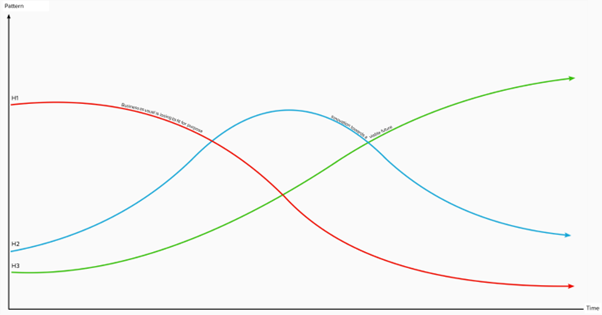Resetting the relationship between local and national government. Read our Local Government White Paper
Explore some of the further information from the Sustainability in Council Services project.
Innovation lab process
The routemaps and outputs from this project were developed using an innovation lab approach to the challenge of embedding sustainability into council services.
The Zero Carbon Britain Innovation Lab team at the Centre for Alternative Technology (CAT) works with partners to solve complex challenges related to tackling the climate and biodiversity crisis. Innovation labs apply participatory and experimental methods to problem solving, involving key stakeholders – those with an interest in the subject of the lab or who would be affected by its outputs – to co-create solutions. This incorporates the voices of the people responsible for implementing the outcomes of the process, enabling greater buy-in and ownership. By drawing on the experience, reflections and feedback of the participants, and sense-checking outputs throughout the lab in a cyclical process, the outputs are co-designed with participants rather than imposed on them.
Innovation labs are run as a series of workshops that either focus on a different theme each time or develop a single theme with participants analysing data in between sessions. The design of the workshops is often dependent on the time available for the project, the availability of the participants, and the breadth of themes to be discussed.
There are five key elements of every innovation:
UN Sustainable Development Goals
The Sustainable Development Goals (SDGs), also referred to as ‘The Global Goals for Sustainable Development’, present social, economic and environmental challenges to be overcome. Governments, councils, businesses and organisations have made commitments to contribute to achieving the SDGs through their work both internally and through collaborative efforts.
Methodology
This section provides an overview of who contributed to the workshops, the tools used during the discussions, and how the routemaps were produced.
Participants
The innovation lab process brings voices from all levels of organisations together into participatory workshops to co-create solutions to achieve the goal.
Invitations were circulated to councils across all regions in the UK through newsletters and LGA regional contacts, with a deliberate focus on bringing as many service areas into the workshops as possible. Although the voices and experience of colleagues working in climate and environmental roles were very valuable and formed a core group of participants, it was important to bring in voices from across councils.
Despite multiple attempts to bring representatives from as many service areas as possible into the conversation, workloads and the timing of the lab meant some services areas were not represented. To counter this, interventions from additional sources and feedback from LGA colleagues working in different sectors have been incorporated.
The workshops included participants working at all levels within councils, officers, managers, directors and CEOs. This approach brings voices from all parts of the system being explored in the lab. It also enables colleagues who may not usually work together to create solutions, drawing on insights and experience from implementation to strategic level. In total, 75 participants joined at least one workshop, with 33 participants attending two or more workshops.
The table shows the number of participants from each service area who participated in the innovation lab. Totals are for all workshops combined – therefore participants appear multiple times.
You can find each service area below with the number of participants in brackets.
- Adult Health and Social Care (4)
- Children's Services (1)
- Climate Change/Environment (51)
- Corporate Strategy (4)
- Education (1)
- Human Resources (4)
- Leisure and Cultural Services (including Libraries, Registration and Archives) (35)
- Low Carbon (4)
- Planning (4)
- Policy and Governance (1)
- Procurement (2)
- Property Management (1)
- Public Health (5)
- Regeneration (1)
- Trading Standards (5)
- Transport (9)
- Waste Management (9)
- Other (Unknown) (1)
Total (142)
The Three Horizons
The themed workshops used the Three Horizons tool. This enables groups of participants to collaboratively explore the current system, envisage the system in a future where we have achieved our goal, and co-design the interventions we need to implement to achieve that goal. Participants first agree the goal of the session and explore this challenge using the tool. The Three Horizons tool can be used in-person or online, and in this instance was used on Mural – an online platform that enables participants to add virtual sticky notes to capture their contributions. Each workshop focused on different themes, with multiple breakout rooms for groups to populate their own Three Horizons template.
The Three Horizons approach uses a graph with three ‘horizons’ or lines moving from the left to the right of the image. The first horizon focuses on barriers in the current system that are preventing the goal from being achieved. Participants start by adding sticky notes to represent barriers they experience. The next horizon participants consider is horizon three – out of sync but the order is important. This horizon invites participants to share a vision of the future where the goal has been achieved. They capture what that future would look like on sticky notes, for example, inefficient buildings have been retrofitted with insulation. Participants then consider horizon two to identify the interventions required to bridge the gap between the current system and the future vision. They draw on examples they are aware of and identify viable interventions that could resolve the barriers currently experienced.
Following the workshops, the Mural boards for each theme were combined to bring together the reflections from all participants and breakout rooms. The horizon two interventions were analysed to identify themes and map these to systems-change models. This analysis enabled the development of leverage diagrams and the core themes and interventions within each category (see routemaps for outputs).
Show and tell blog
On 16 March 2023 the Local Government Association (LGA) held a webinar along with the Centre for Alternative Technology (CAT). The webinar was held to highlight the Innovation Lab that the LGA commissioned CAT to deliver. This aim of this webinar was to bring together Council staff from a range of service areas to discuss how they have developed a series of themed route maps and outputs based on the participants’ discussions.
196 people attended the webinar with the session chaired by Olivia Lancaster, Adviser – Productivity, Climate Change and Economic Growth, LGA who gave an overview of the programme as well as introducing the following speakers and panellists:
- Dr Anna Bullen, Innovation Lab Manager, Zero Carbon Britain Hub and Innovation Lab
- Sarah Briggs, Research Assistant, Zero Carbon Britain Hub and Innovation Lab
- Diana Divajeva, Principal Public Health Analyst, City of London and London Borough of Hackney
- Amy Allen, Graduate Climate Change Officer, Tunbridge Wells Borough Council
- Siobhan Maguire, Project Manager – Climate Change, Wakefield Council
CAT undertook this work through their Innovation Lab process outlining how this was achieved.
Dr Anna Bullen, Innovation Lab Manager, Zero Carbon Britain Hub and Innovation Lab
The Zero Carbon Britain Hub & Innovation Lab was set up three years ago to improve the capacity of councils, communities and organisations to act on the climate and ecological emergency, create systemic change and increase resilience to climate change; this is done primarily through training and innovation labs. An innovation lab is a collaborative complex problem-solving process that engages diverse stakeholders to co-create solutions that will address the climate and nature emergencies.
The idea for the LGA innovation lab was to develop some guidance accessible to everyone to enable sustainability to be embedded into all council service areas rather than sustainability being the responsibility of a sole climate change officer.
By bringing together representatives through a series of workshops from a range of different councils, locations and service areas to better understand the barriers faced and to work with participants to co-design interventions that would be meaningful and relevant, CAT were able to turn these into the guidance that is now available on the LGA webpages.
The six workshops CAT delivered covered the following themes: energy, waste, buildings, transport and land use, land use change and forestry, and agriculture. They looked at what the barriers were to improve sustainability within these themes, and what the vision was for when the barriers were overcome.
Sarah Briggs, Research Assistant, Zero Carbon Britain Hub and Innovation Lab
Focussing on the participation side of the Innovation Lab, CAT worked with the LGA to recruit participants from councils across England to give geographic representation. Drawing expertise from as wide a range of service areas as possible gave people the chance to learn from each other and share knowledge, as well as understand how the themes of the workshops and the guidance interact with and impact on different areas.
Along with different categories of councils contributing to the workshops, including borough, city and county, it was important to make sure there was a range of roles represented from officers to senior managers and heads of service.
Having this range of geographies, types of councils and diversity of officers and members, enabled the notable practice to suggest interventions that could be relevant to as many communities as possible.
The data collection method CAT used was The Three Horizons tool, which is an effective way to make sense of, and facilitate, social transformation and to explore innovation and action in the face of uncertainty. This tool supports participants to collectively explore the barriers towards a goal that is being pursued.
Participants were asked to consider STEEP during the workshop which stands for:
- Social
- Technological
- Environmental
- Economic
- Political factors
The above can be part of the barriers hindering progress but equally can be part of making preferred futures a reality.
Some of the cross cutting themes that appeared more than once when running the Innovation Labs can be found on the LGA web pages along with the guidance.
Panel discussion
We heard from several council participants who took part in the labs, here they share their thoughts on the experience as well as providing insights into their council sustainability challenges.
Dr Anna Bullen and Sarah Briggs led the discussion
- Diana Divajeva, Principal Public Health Analyst, City of London and London Borough of Hackney
- Amy Allen, Graduate Climate Change Officer, Tunbridge Wells Borough Council
- Siobhan Maguire, Project Manager – Climate Change, Wakefield Council
The panellists were asked about why they signed up to the lab process in turn giving a variety of reasons, including building sustainability across all service areas from housing to health, transport, land, energy and wider. For others, it was due to the council developing their climate change strategy and the challenges faced with achieving this or being new to a council, and another way to find out the structure, functions, and service areas through the lens of sustainability and climate change.
We then asked the panellists to think about why it is important to embed sustainability in all service areas. Siobhan Maguire, Wakefield Council answered that due to the scale of the problem of climate change, it means that sustainability needs to be an integral part of all service area operations as there is not one service that is exempt. Amy Allen, Tunbridge Wells added coming from an adaptation perspective, it is important that we embed sustainability across all service areas to ensure that councils can maintain their service provision.
Given that many councils are facing huge challenges including budget cuts and having had to deal with Covid, the panellists shared examples of the challenges they see from their perspective within their respective service areas. Diana Diajeva, London Borough of Hackney talked about the social justice aspect and the need to be careful that we ensure that sustainable choice is an easy choice for people, and not a luxury that they may not be able to afford.
Resisting silo working, maintaining relationships across departments, establishing new ways of working and thinking has sometimes encountered resistance amongst staff, often due to the heavy workload that staff already deal with; working with and not to or against is crucial.
The panellists shared their key learnings from the lab sessions which were the opportunities to network with other officers across the country working across different levels of management, and how they can embed climate change accountability into their level of management. The chance to have open and honest conversations about climate change was empowering. One of the big takeaways was that, regardless of service, area and the size of the council, or where it was geographically, the same limiting factors came up time and again, these limiting factors are capacity, the right people, enough people and the rights skills.
The panel’s reflections on the process included gaining confidence, being in a supportive atmosphere, being able to learn from experts as well as using the Horizon tool, engaging with new people, learning about general barriers to implementing sustainability and networking and how well the online sessions were delivered.
Q&A
Glossary
Co-creation
A collaborative process which brings a diverse range of stakeholders together to blend their beliefs, ideas and knowledge. Participants create understanding about a challenge or problem and generate solutions based on their shared perspectives, ideas and experience. The greater the diversity of stakeholders working together in the process, the greater the potential for innovation.
Innovation lab
An experimental and collaborative problem-solving process often made up of a series of workshops or sessions. The innovation lab uses design thinking to bring together diverse stakeholders to better understand the problem, envision a future where the problem has been resolved and co-design interventions that will transform the current system in order to achieve the vision. An iterative approach is taken to review and amend solutions until a suitable outcome is achieved.
Mural
A collaborative online tool which enables remote participation in activities. Mural was used during breakout room sessions to capture participants’ input on virtual post-it notes.
Settlement hierarchy
A method of classifying and ranking settlements based on the range and number of facilities available. Services situated in higher tiers of a hierarchy are more accessible using active travel due to the reduced distances between settlements and residents.
Sixth Carbon Budget
The Sixth Carbon Budget report is a requirement under the Climate Change Act, 2008, which sets out guidance on the amount of greenhouse gases that can be emitted in the UK between 2033-2037. It is based on an extensive programme of analysis, consultation and consideration by the Climate Change Committee. The Climate Change Committee is an independent, statutory body established under the Climate Change Act, whose purpose is to advise the UK and devolved governments on emissions targets and to report to Parliament on progress made in reducing greenhouse gas emissions and preparing for and adapting to the impacts of climate change.
Stakeholders
Any person or organisation which has an interest in and/or influence over the process (be that a decision, a policy, a strategy or a proposed project). Stakeholders could be responsible for tackling the challenge and implementing the decision, policy or strategy; or they could also be impacted by the resultant decision, policy or strategy.
Sustainable Development Goals (SDGs)
Also called the ‘Global Goals’, the SDGs are a collection of 17 global goals adopted by all United Nations Member States. They are designed to be a ‘blueprint to achieve a better and more sustainable future for all’. Set up in 2015, and anticipated to be achieved by 2030, these goals – to name a few - seek to realise human rights for all, achieve gender equality and empower all women and girls, eradicate poverty in all its forms everywhere and end world hunger.
The system
A system is a set of ‘things’ (can be people, cells, molecules etc.), which are interconnected aspects of a whole that interact according to a set of rules and procedures and produce their own pattern of behaviour over time. In this case, ‘the system’ is council services and their processes, practices and spheres of influence within society – the social and governance structures that enable and limit action by and within councils.
Three Horizons
The Three Horizons is an effective tool for making sense of and facilitating social transformation and exploring innovation and action in the face of uncertainty. The tool supports participants to collectively explore the barriers to the goal being pursued, create a vision of a future where the goal has been achieved, and co-design interventions required to achieve the vision. The change from the established pattern of the first horizon to the emergence of fundamentally new patterns in the third occurs via the transition activity of the second horizon.



